unit2Howoftendoyouexercise全单元教案
人教版英语八年级上册Unit2Howoftendoyouexercise大单元教学设计

4.教学重难点的突破设想:
(1)针对一般现在时态与频率副词的结合运用,采用以下方法:
a.设计丰富的课堂活动,如角色扮演、小组讨论等,让学生在互动中自然运用一般现在时态和频率副词。
b.创设生活情境,让学生编写关于自己和他人运动习惯的小对话,提高学生的实际运用能力。
4.听力练习:教师推荐一些与运动相关的英语听力材料,如播客、短视频等,要求学生在课后进行听力训练,提高听力理解能力。
5.互动讨论:鼓励学生在家中与家人、朋友讨论以下问题,并用英语表达自己的观点:
- How do you think exercise can benefit our health?
- What sports do you like to do with your family or friends?
- How can we encourage more people to exercise regularly?
6.视频分享:学生可以拍摄一段关于自己运动习惯的短视频,分享到班级群,让同学们互相了解、交流,提高英语实际运用能力。
注意事项:
1.作业布置要注重层次性和多样性,以满足不同学生的学习需求。
-问题示例:“Can you remember what we learned last class? What tense did we use to talk about our daily routines?”
2.利用多媒体展示一组关于运动的图片,让学生猜测图片中人物的运动频率。
-示例:“Look at these pictures. Can you guess how often they exercise?”
How+often+do+you+exercise++Section+A+(2d-3c)教案 人教版
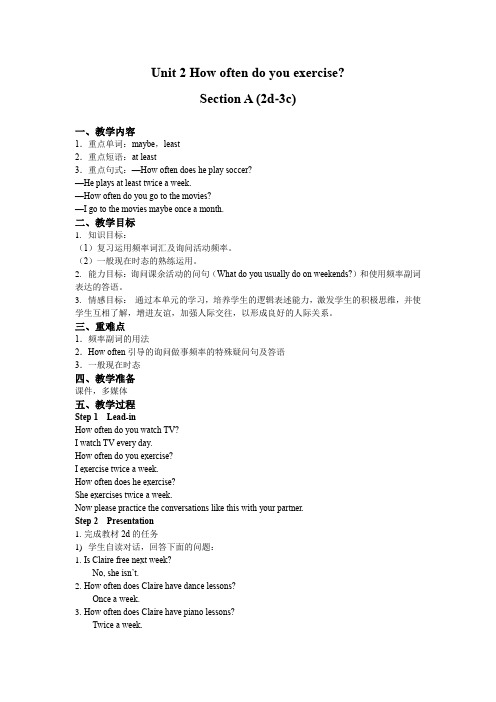
Unit 2 How often do you exercise?Section A (2d-3c)一、教学内容1.重点单词:maybe,least2.重点短语:at least3.重点句式:—How often does he play soccer?—He plays at least twice a week.—How often do you go to the movies?—I go to the movies maybe once a month.二、教学目标1.知识目标:(1)复习运用频率词汇及询问活动频率。
(2)一般现在时态的熟练运用。
2.能力目标:询问课余活动的问句(What do you usually do on weekends?)和使用频率副词表达的答语。
3.情感目标:通过本单元的学习,培养学生的逻辑表述能力,激发学生的积极思维,并使学生互相了解,增进友谊,加强人际交往,以形成良好的人际关系。
三、重难点1.频率副词的用法2.How often引导的询问做事频率的特殊疑问句及答语3.一般现在时态四、教学准备课件,多媒体五、教学过程Step 1Lead-inHow often do you watch TV?I watch TV every day.How often do you exercise?I exercise twice a week.How often does he exercise?She exercises twice a week.Now please practice the conversations like this with your partner.Step 2Presentation1.完成教材2d的任务1)学生自读对话,回答下面的问题:1.Is Claire free next week?No, she isn’t.2.How often does Claire have dance lessons?Once a week.3.How often does Claire have piano lessons?Twice a week.4.What does Claire do on Tuesday?She plays tennis.5.Does Jack want to join them?Yes, she does.2)大声朗读2d对话,读熟后与小组成员结对分角色表演对话。
【人教版】八年级英语上册 Unit 2 全单元英文教案

Unit 2 How often do you exercise?Language Goal 【语言目标】Talk about how often you do things:in this unit,students learn to talk about what things they do and how often they do these things.Knowledge Goals 【知识目标】Key Wordshousework,hardly,ever,once twice,full,maybe,least,junk,coffee,health,percent,online,although,through,mind,body,such,together,die,writer,dentist,magazine,however,than,almost,less,pointKey Phraseshow often,on weekends,go to the movies,hardlyever,twice a week,three times a week,be goodfor,at least,such as,less than,more than Key Sentences1. How often do you exercise?2.What do you usually do on weekends?Key Grammar1. The use of adverbs of frequency.2.“How often” cause of special questions andanswers.Ability Goals 【能力目标】1. Through the learning to gain the ability to talk about how often people do things.2.Write a report about how often people do things.Moral Goals 【情感目标】1. Keep a diary every day.2.Do more exercise and develop good habits to keep healthy.Teaching Time 【课时】Five periodsPeriod 1 Section A(1a-2d)Period 2 Section A(Grammar Focus-3c)Period 3 Section B(1a-1e)Period 4 Section B (2a-2e)Period 5 Section B (3a-Self Check)本单元的教学内容围绕“多久做一次运动”这一话题展开。
How often do you exercise全单元电子表格教案
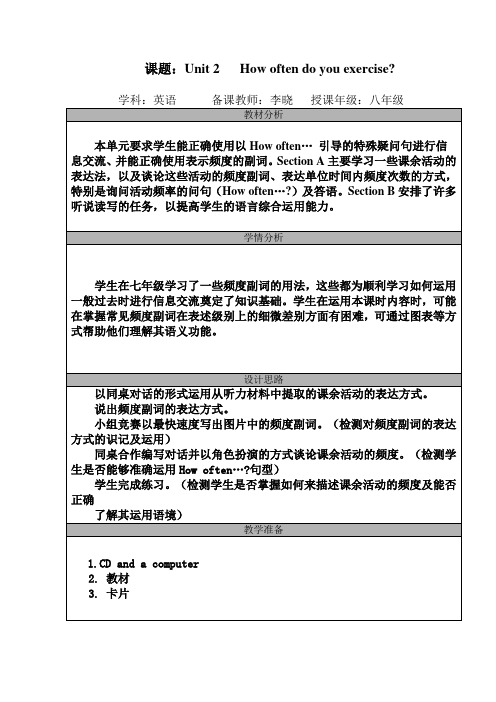
2. Ss listen and write the letters from the picture above on the line below.
提高学生的听力水平,为后面的读写打好基础
课题:Unit 2 How often do you exercise?
学科:英语备课教师:李晓授课年级:八年级
教材分析
本单元要求学生能正确使用以How often…引导的特殊疑问句进行信息交流、并能正确使用表示频度的副词。Section A主要学习一些课余活动的表达法,以及谈论这些活动的频度副词、表达单位时间内频度次数的方式,特别是询问活动频率的问句(How often…?)及答语。Section B安排了许多听说读写的任务,以提高学生的语言综合运用能力。
为本单元新课展开话题做准备,同时开阔学生的思维
Ⅳ.Listening
1. Play the tape for the first time. Ss listen and fill in the blanks.
2. Play the tape for the second time for the Ss to check the answers.
领读频率副词
1.学生根据自己的实际回答I usually …… on weekends.
2.学生回答
3.学生快速认读
always (100%) usually(80%) often (30-50%)
sometimes (20%) hardly ever(5%) never (0%)
训练学生的口语表达能力
Unit2Howoftendoyouexercise大单元整体教学设计人教版英语八年级年级上册
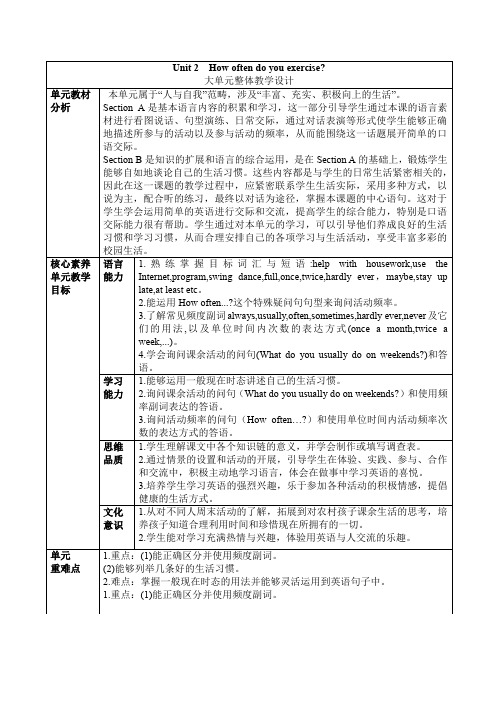
1.复习运用表示频率的词汇及询问活动频率。
2.一般现在时态的熟练运用。
3.让学生通过本单元的学习,养成健康的生活习惯,保证充足的睡眠时间,进行适当的运动锻炼,以保持健康的体魄。培养学生的逻辑表达能力,激发学生的积极思维,并使学生互相了解,增进友谊,提升人际交往能力,形成良好的人际关系。
2.通过情景的设置和活动的开展,引导学生在体验、实践、参与、合作和交流中,积极主动地学习语言,体会在做事中学习英语的喜悦。
3.培养学生学习英语的强烈兴趣,乐于参加各种活动的积极情感,提倡健康的生活方式。
文化
意识
1.从对不同人周末活动的了解,拓展到对农村孩子课余生活的思考,培养孩子知道合理利用时间和珍惜现在所拥有的一切。
3.了解常见频度副词always,usually,often,sometimes,hardly ever,never及它们的用法,以及单位时间内次数的表达方式(once a month,twice a week,...)。
4.学会询问课余活动的问句(What do you usually do on weekends?)和答语。
学习
能力
1.能够运用一般现在时态讲述自己的生活习惯。
2.询问课余活动的问句(What do you usually do on weekends?)和使用频率副词表达的答语。
3.询问活动频率的问句(How often…?)和使用单位时间内活动频率次数的表达方式的答语。
思维
品质
1.学生理解课文中各个知识链的意义,并学会制作或填写调查表。
2.通过大量练习,进一步巩固一般现在时态的用法。
3.通过健康测试让学生明确:要想健康,最重要的方式就是运动。
人教版初二英语上册Unit 2 How often do you exercise单元教案

第一课时Section A (1a~2d)【学习目标】1.学生能掌握六个频率副词的用法。
2.学生能听懂谈论各项活动的对话;学会用英语谈论做各项活动的频率。
3.通过完成各项活动,学生能够养成团结协作的意识,并能合理利用时间。
【学习重点】学生能够学会用六个频率副词谈论做各项活动的频率。
【学习难点】通过交流表达和听力训练,掌握六个频率副词Learning action tips:Play the video about students' activities on weekends in class. Let students watch it.Task 1Learning action tips:Preview the words on Page2 in the word list. Students read the words by phonetic symbols, then underline new words in the text and mark the Chinese meaning. At last finish the task in 1a.【知识链接】▲once,twice,three times等次数的表达法(1)这三个词都表示次数,once是一次,twice是两次,除了一次、两次,其他的次数都用“数字+times”表达。
如:三次是three times,五次是five times。
(2)这些表达数的词后与一段时间连用,表示动作多长时间发生几次,即动作的频率。
【导练】(1)我一周看一次电视。
I watch TV once a week.(2)我每天读三次英语。
I read English three times__ a day.情景导入生成问题T:What do you usually do on weekends?S1:I usually play basketball.S2:I often go shopping.S3:I sometimes help my parents with housework.自学互研生成能力Task 1Let's read new words and the phrases.1.I can read.(我会读)housework,once,twice,Internet,program,always,usually,often,sometimes,hardly ever,never2.I can write.(我会写)翻译下列短语和句子。
Unit2Howoftendoyouexercise?大单元教学设计人教版英语八年级上册

《How often do you exercise?》单元教学设计学科核心素养与课材分析:本单元主题内容为课余活动(Free time activities),话题为“做事的频率”,属于新课标中“人与自我"范畴中的“生活与学习",涉及“丰富、充实、积极向上的生活”和“身心健康、良好的生活习惯”。
教学内容围绕“多久做一次运动”这一话题展开。
SectionA是基本语言内容的收集与学习,这一部分引导学生通过本课的语言素材进行看图说话、句型演练、实际描述,通过对话表演等使学生能够正确地使用表示做什么活动的词组、多久做一次的句型,从而熟练地谈论多久做一次活动。
SectionB是知识的扩展和语言的综合运用,是在SectionA的基础上,锻炼学生能够自如地讨论自己的生活习惯,对语言现律进行观察与探究、训练与巩固,增进相互了解,拓宽知识面,激发其对英语学习的兴趣,并增强通过运动等健康活动养成良好生活习惯的意识。
通过本单元的学习,夯实了基本的语言能力,发展了语言运用能力以及思维能力,培养了积极的情感态度,并提高了运用有效的学习策略来完成学习任务的能力。
1.语言能力:能够在记者采访“生活习惯大调查”等真实情境中综合运用有关课余活动和饮食等生活习惯的表达、频度副词和短语以及how often引导的特殊疑问句,询问和描述从事周末活动、课余活动的频率;提升听说能力、阅读技能,并培养自己良好的写作习惯。
2.思维品质: 能够了解国外中学生常见业余活动,增进理解,并树立丰富自己的课余生活意识;同时,注重健康饮食.适量运动和保证充足睡眠,以便加强良好生活习惯的养成。
3.文化意识:通过听说读看写等训练,能够准确获取有关课余活动、生活习惯和某人从事某一活动的频率的信息,在此基础上联系自身实际,有逻辑、辩证地、创新性地表达个人看法和意愿,实现知识与思维能力的迁移;4.学习能力:能够通过了解彼此的课余生活和生活习惯,激发英语学习兴趣;并通过多种渠道进行英语学习;在自主学习和合作探究中提升英语听说读写策略的实践能力和团队协作力。
unit 2 How often do you exercise 全单元教案 (5课时).doc

Unit 2 How often do you exercise?Period 1 (1a-2c)学习内容:1a 复习动词短语并学习help with housework,1b-1c 复习频率副词,学习hardly ever, 2a-2b学习“How often do you…?”及其答语。
Learning aims:Words and phrases:housework; hardly ever; once; twice; Internet; program.Target language:what do you usually do on weekends? I usually go to the movies.What does she /he do usually on weekends ? She often goes to the movies .How often do you does he /she go to the movies? Twice a week.Ability aims:1. Can read the new words and phrases; can use the target language to talk about the things.2. To improve students’ writing skill, listening skill and communicative competence. Learning important and difficult points:Words and phrases:Target language:Moral ObjectLearn to express their daily activities, and love the life.Teaching procedures:Step 1 . Lead in:1. Listen to a song.2. Talk about your last weekend’s activities.Step 2 Presentation.1. T:“What do you usually do on weekends ? ”S: I usually …… on weekends.2. Show the frequency words and read.always (100%) usually(80%) often (30-50%)sometimes (20%) hardly ever(5%) never (0%)3. Pair work: -- What do you do on weekends?--I …(Use the frequency words.)--What does she/he do on weekends?-- She/He ___________ _________________.Show some verb phrases: watch TV,read books,exercise,swim, play football、go shopping4. Learn the new language.A: How often does he do sports?B: He always…in the morning.He often…, but sometimes he … And he hardly ever … He never ...Step 3 . Work on 1a.1. Look at the picture. Discuss with your partners. Make a list of the weekend activities.2. Let some Ss read out their activities. Let other Ss add more activities.Step 4 . Work on 1b.1. Let a student read the words aloud. Make sure all the Ss know the meaning of the words.2. Tell Ss to listen and write the letters from the picture above on the line below.3. Play the tape for the first time. Ss listen and fill in the blanks.4. Play the tape for the second time for the Ss to check the answers.Step 5. Pair work.1. Act out the conversation with a student.2. Let Ss talk about the pictures in 1a in pairs.3. Let some Ss act out their conversations.Step 6 Learn the new language.Show the pictures and ask and answer: How often do you exercise?--Twice a week.Step 7. Work on 2a:1. Let Ss read the phrases in the chart.2. Tell Ss that Cheng Tao is taking about how often he does these activities. Play the recording for the first time. Ss listen and number the activities [1-5].3. Play the recording for the second time for the Ss to check the answers.Step 8.Work on 2b:1. Tell Ss they will hear the recording again. This time, listen and match the activities in 2a with how often Cheng Tao does them.2. Ss listen and math the activities with the phrases.3. Check the answers.Step 9. Pair work.1. Ask one student how often he/she watch TV as a model.T: Hi, S1. How often do you watch TV? S1: I watch TV every day.T: What’s your favorite program? S1: Animal world.T: How often do you watch it? S1: Twice a week.2. Let one student read the activities in the chart. Tell them these new words:favorite website (最喜欢的网站);favorite sport (最喜欢的运动)3. Ss work with their partners. Then ask some pairs to act out their conversations.Step 10. Writing.According to the conversation, write about how often your partner do the activities.Example: ×× is a Middle School student. He reads English twice a week. He watches TV every day. He goes to the movies once a month, and he exercises three times a week. But he hardly ever uses the Internet.Step 11 Summarize. Unit 2 How often do you exercise? What do you usually do on weekends? I usually go to the movies. What does she /he do usually on weekends ? She often goes to the movies . How often do you does he /she go to the movies? Twice a week.always 100% usually 80% often 30-50% sometimes 20% hardly ever 5% never 0%Period 2 (2d-3c)Learning aims:Words and phrases:full, swing, swing dance, maybe, least, at leastTarget language:—How often do you /does he(she)….? —He usually…The use of the frequency words: always; usually ; often ; sometimes; hardly ever; never Ability aims:1. Can read the new words and phrases; can use the target language to talk about the things.2. To improve students’ writing skill, listening skill and communicative competence. Learning important and difficult points:Words and phrases and target language:Moral ObjectLearn to express their daily activities, and love the life.Teaching procedures:Step 1 Review:1.Show a subject schedule, ask and answer:How often do you have _________ class? --We have _________class ____________.Step 2 Work on 2d.1. Lead in: Show some pictures and practice:A: What does she usually do? --B: She usually has piano lessons.A: How often does she have piano lessons? --B: She has piano lessons twice a week.2. show a video, and ask : What dance? –swing dance.Claire are having dance and piano lessons. Let’s listen to her and Jack’s conversation, listen and answer:3. Read the conversation and match the activity with the right time.4. Follow the tape and then Role-play the conversation.Step 3 Grammar focus:1. Practice: show the pictures and the pie charts, ask and answer:T: How often does he play soccer ? The other Ss: He plays soccer twice a week2. read grammar focus and give some explanations.Step 4 Work on 3a.Complete the questions with do or does. Then match the questions and answers.Step 5 Work on 3b.1. Tell Ss to make questions.2. Then try to ask and answer questions about the questions.3. Ask some Ss to ask and answer with their partners in front of the class.Step 6 Work on 3c.1. Let Ss work in groups of six or e ight.2. Tell Ss discuss what activities they do to improve their English. Then write the activities inthe chart.3. Ask their group mates the questions and fill in the chart.4. Try to make a report about their partners.Period 3 Section B (1a-1e)Learning aims:Words and phrases:Learn to use “junk, junk food, coffee, health, drink coffee, be good for”Target language:what do you usually do on weekends?I usually go to the movies.What does she /he do usually on weekends ?She often goes to the movies .How often do you does he /she go to the movies?Twice a week.Ability aims:1. Can read the new words and phrases;2. can use the target language to talk about how often you do things.3. ask people about their healthy habits and express themselves4. To improve students’ writing skill, listening skill and communicative competence. Learning important and difficult points:Words and phrases and target language.Moral ObjectLearn how to arrange the life, to develop good habits.Teaching procedures:Step 1 .Warming up and leading in:1. T: Hello, everyone! Do you like music? Now let’s listen to Do You Like….If you can sing the song, you can sing it together. Listen carefully, then who can say thenames of the food or drink ?Play the video.2. Some foods are healthy foods, some are not. Write “healthy food ; unhealthy food(junkfood)” Say the healthy food and junk food.3. Students draw the pictures of the food that they like. Then students say“I like… becauseit/they”“I I like… although it/they…”Step 2 Pair work.1. Let’s ask about how often you eat food.example: A: How often do you drink milk?B: I drink milk every day.A: Do you like it?B: No. But my mother wants me to drink it. She says it’s good for my health.2. Students work.Step 3 Work on 1a.T:Now open your books and turn to page 12. Look at 1a, match the words with the pictures.( Students match them.)Step 4 .Work on 1c.1. T: Eating healthy food can help us to keep healthy. It’s a good habit. What are the goodhabits for your health. Exercise; sleep2. Listen for the general idea of 1c.T: Next we’ll listen to a conversation between Tina and Bill.First let’s listen for the general idea.Students listen and give their answers.3. Listen for the specific ideas of 1c .T: Listen carefully again and Circle the answer to each question.4. Check the Ss’ answers.Step 5. Work on 1d.1. T: Now look at the questions in 1d . Fill in the blanks in the survey.2. Play the first time, you can just listen.Play the tape for the second time ,you can listen and find the answers.3. Check the answers.4. Listen and repeat. T: I’ll play the recording again. You’ll repeat it after the tape.Step 6. Pair work.Role play. Student A is the reporter. Student B is Tina or Bill. Try to act the conversationout .They can use their own words.Example: A: How often do you exercise?B: I exercise every day.A: And how often do you …?Step 7. Take the health quiz.(p16)Step 8. Summarize.T: And you know: Healthy lifestyle can help us get good grades. Good food and exercise help us to study better. Look at saying.Period 4 section B (2a-2e)Step 1 . Warming- up and revision1. Daily greeting.2. Let some Ss report what he/she does on weekends.Step 2 Work on 2a.1. Let Ss discuss the activities with their classmates and rank these activities according to howoften you think your classmates do them.2. Let some Ss tell their answers.S tep 3 . Work on 2b.1. T: Here are the results of what the students in No. 5 High School do in their free time. Readthe passage quickly and find the answers to the two questions:1) How many kinds of free time activities are mentioned in the passage?2) What is the best way to relax? _________________________________2. Read the passage carefully and complete the pie chart below.Ss read the passage and try to fill in the pie chart. Then check the answers together.Step 4 Work on 2c.1. T: Now let’s read through the five questions. Make su re the Ss know the meaning of thequestions. Then le t Ss read the passage again and try to find the answers to the questions.2. Ss read carefully and try to find the answers to the questions.3. Check the answers with th e class.Step 5 Work on 2d.1. T: Now let’s make some sentences with the percentages using always, usually orsometimes.2. Ss read the passage again and try to make some new sentences. Check the answers witheach others.Step 6 Work on 2e.1. Let Ss read through the activities in the chart first. Select one activity from them. Then asktheir classmates how often they do this activity and make a pie chart.2. Ss work in groups. Ask and answer questions then fill in the chart.3. Make a pie chart like those in 2b.4. The n try to make a short report like the report in 2b.Step 7. HomeworkPeriod 5 Section B (3a-self check)Step 1 . Warming- up and revision.1. Have a dictation of the new words and expressions.2. Let some Ss read the passage in 2b.3. Check the homework.Step 2 . Presentation.1. Show some pictures of your daily activities. Tell Ss your good activities and badactivities.2. Let some Ss tell about how often they do some activities and judge they are good habits andbad habits.Step 3. Practice –work on 3a.1. Look at the information in the chart and complete the report.2. Ss read the passage then fill in the blanks with the words in the box.3. . Check the answers.Step 4. Writing--work on 3b.1. Complete the chart with your own information. Then in the last column, use expressionslike always, every day, twice a week and never.2. Then let some Ss show their chart to the class.Step 5 Work on 3c.1. Let Ss write a report about their good habits and bad habits. Say how often they do thingsusing the report in 3a as an example.2. Students write.3. Check the compositions and let some Ss read their compositions.Step 6 Self Check 1 and 2.1. Students discuss.2. Let some Ss read aloud their chart. Then try to write five sentences using the informationabove.3. Make sure they use the correct forms of the verbs.Step 7 Self check 3.1. Tell Ss that they should read the conversation and then fill in the blanks with the rightforms.2. Ss read the conversations and try to fill in the blanks.3. Check the answers:usually, How often, Hardly, How often, once a; never4. Let Ss practice the conversation with their partner.Step 8. Homework.1. Review Section B.2. Write a short passage your father or m other’s good ha bits or bad habits.。
人教新目标英语八年级上册Unit2全单元教学设计

人教新目标英语八年级上册Unit 2 How often do you exercise?Period 1 (1a-1c)教学目标:1. Knowledge objectsName of activities.Aderbs of frequency.What do you usually do on weekends?I often go to the movies.2. Ability objectsWriting skill.Listening skill.Communicative competence重点:Watching TV, reading, shopping Skateboarding, exercising难点:Always, usually, often, sometimes Hardly, ever, neverWhat does she do on weekends? She often goes to the movies.教学用具:A tape recorder. Large monthly calendar showing the days of the week.学习指导:Discover method. Listening and writing methods;Pairwork.教学设计:Step 1 . Lead in: (5 minutes)1. Listen to a song.2. Talk about your last weekend’s activities.Step 2 Presentation.(10 minutes)1. T:“What do you usually do on weekends ? ”S: I usually …… on weekends.2. Show the frequency words and read.always (100%) usually(80%) often (30-50%)sometimes (20%) hardly ever(5%) never (0%)3. Pair work: -- What do you do on weekends?--I …(Use the frequency words.)--What does she/he do on weekends?-- She/He ___________ _________________.Show some verb phrases: watch TV,read books,exercise,swim, play football、go shopping4. Learn the new language.A: How often does he do sports?B: He always…in the morning. He often… , but sometimes he … And he hardly ever … He never ...Step 3 . Work on 1a. (5 minutes)1. Look at the picture. Discuss with your partners. Make a list of the weekend activities.2. Let some Ss read out their activities. Let other Ss add more activities.Step 4 . Work on 1b.(5 minutes)1. Let a student read the words aloud. Make sure all the Ss know the meaning of the words.2. Tell Ss to listen and write the letters from the picture above on the line below.3. Play the tape for the first time. Ss listen and fill in the blanks.4. Play the tape for the second time for the Ss to check the answers.Step 5. Pair work. (10 minutes)1. Act out the conversation with a student.2. Let Ss talk about the pictures in 1a in pairs.3. Let some Ss act out their conversations.习题设计(10 minutes)Exercises:st summer vacation, we _____many photos when we had a trip to Dalian.A.takeB. takesC. tookD.will take2. –Mum,I’m hungry.Is there _____to eat?A. somethingB. nothingC. anythingD.everything3.After a long walk in the sun, they wanted to drink_______.A. cold somethingB. something coldC. nothing coldD. cold anything4.Did Lisa tell you______in the letter?A. funny anythingB. anything funnyC.funny somethingD. something funnyHomework教学反思时间教学课题Unit 2 How often do you exercise?Period 2 (2a-2d)教学目标:1.Words: Housework, hardly, ever, hardly ever, once, twice, Internet, program,full , swing, swing dance, maybe,2) Sentences--what do you usually do on weekends?--I always excersise.--How often do you go to the movies?--I go to the movies maybe once a month.3) Be able to understand the dialogues about how often people do things.教学重点:1. Master the words and target language;2.Master the sentence students structures “How often …?教学难点:To improve students’ listening skill and cooperative skill.学习指导:Discover method Listening and reading methods. Communicative qpproach.教学用具:A tape recorder. Some color paper for an activity.教学过程Step 1.Learn the new language.(5 minutes)Show the pictures and ask and answer: How often do you exercise?--Twice a week.Step 2. Work on 2a: (5 minutes)1. Let Ss read the phrases in the chart.2. Tell Ss that Cheng Tao is taking about how often he does these activities. Playthe recording for the first time. Ss listen and number the activities [1-5].3. Play the recording for the second time for the Ss to check the answers.Step 3.Work on 2b:(5 minutes)1. Tell Ss they will hear the recording again. This time, listen and match theactivities in 2a with how often Cheng Tao does them.2. Ss listen and math the activities with the phrases.3. Check the answers.Step 4. Pair work. (5 minutes)1. Ask one student how often he/she watch TV as a model.T: Hi, S1. How often do you watch TV? S1: I watch TV every day.T: What’s your favorite program? S1: Animal world.T: How often do you watch it? S1: Twice a week.2. Let one student read the activities in the chart. Tell them these new words:favorite website (最喜欢的网站);favorite sport (最喜欢的运动)3. Ss work with their partners. Then ask some pairs to act out their conversations. Step 5.Summarize.(5 minutes)Unit 2 How often do you exercise?What do you usually do on weekends?I usually go to the movies.She often goes to the movies .Twice a week.Step 6Work on 2d. (10 minutes)1. Lead in: Show some pictures and practice:A: What does she usually do? --B: She usually has piano lessons.A: How often does she have piano lessons? --B: She has piano lessons twice a week.2. show a video, and ask : What dance? –swing dance.Claire are having dance and piano lessons. Let’s listen to her and Jack’s conversation, listen and answer:3. Read the conversation and match the activity with the right time.4. Follow the tape and then Role-play the conversation.习题设计(10 minutes))汉译英:1.几乎从不____________2.至少,不少于________________3.一天一次________________4.一周两次___________________5.一个月三到四次________________6. 垃圾食品_________________7.喝牛奶___________________8.多于__________________9.最受欢迎的__________________10.保持健康_________________ Homework教学反思时间教学课题Unit 2 How often do you exercise?Period 3 (3a-3c)教学目标:1.Words and phrases:full, swing, swing dance, maybe, least, at least2.Target language:—How often do you /does he(she)….? —He usually…The use of the frequency words: always; usually ; often ; sometimes; hardly ever; never重点:Words and phrase难点:target language:教学用具: Tape recorder; Multi-Media;PPT学习指导:Task-based language teaching、create the language situation.教学设计:Step 1 Review: (5 minutes)1.Show a subject schedule, ask and answer:How often do you have _________ class? --We have _________class ____________.Step2 Grammar focus .(5 minutes)Let the students read the text. Invite some students to read the sentences in the boxand explain their Chinese meaning.为学生解释其中的语法点。
How often do you exercise 教案
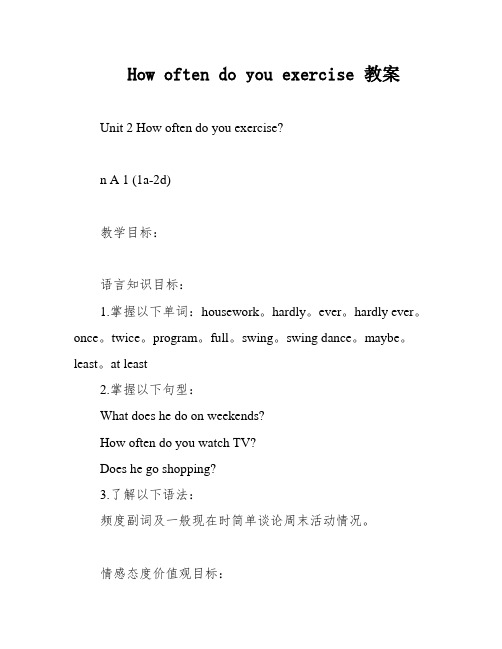
How often do you exercise 教案Unit 2 How often do you exercise?n A 1 (1a-2d)教学目标:语言知识目标:1.掌握以下单词:housework。
hardly。
ever。
hardly ever。
once。
twice。
program。
full。
swing。
swing dance。
maybe。
least。
at least2.掌握以下句型:What does he do on weekends?How often do you watch TV?Does he go shopping?3.了解以下语法:频度副词及一般现在时简单谈论周末活动情况。
情感态度价值观目标:通过本单元的研究,养成健康的饮食惯,保证充足的睡眠时间,进行合理的运动锻炼,以保持健康的体魄。
培养学生的逻辑表述能力,激发学生的积极思维,并使学生互相了解,增进友谊,加强人际交往,以形成良好的人际关系。
教学重点:1.对6个频度副词细微差异的理解及使用。
2.弄清一般现在时在不同人称下动词形式及提问的变化。
教学难点:1.第三人称单数谓语动词在此核心句型中的运用。
2.谈论课余时间的各项活动,以及初步认识和使用频率副词。
教学过程:Ⅰ。
导入谈论上个周末的活动。
Ⅱ。
呈现1.教师问:“你周末通常做什么?”并且板书。
让学生根据自己的实际情况回答“I usually…”。
2.教师出示动词卡片,如“watch TV”,“read books”,“exercise”,“swim”,“play football”,“go shopping”,“go to movies”,让学生回答。
3.点击鼠标屏幕上出现频率副词及相关的百分比,如“always”(100%),“usually”(80%),“often”(30-50%)。
以下省略)III。
Writing1.Take a look at the picture and discuss with your partner。
unit 2 How often do you exercise 全单元教案 (5课时)
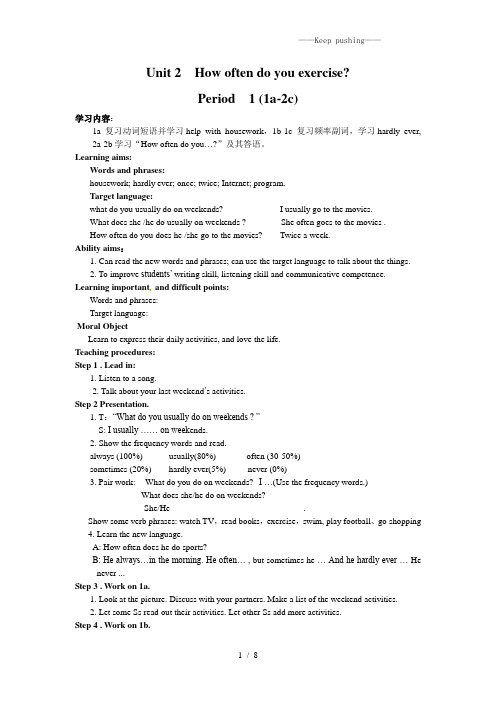
Unit 2 How often do you exercise?Period 1 (1a-2c)学习内容:1a 复习动词短语并学习help with housework,1b-1c 复习频率副词,学习hardly ever, 2a-2b学习“How often do you…?”及其答语。
Learning aims:Words and phrases:housework; hardly ever; once; twice; Internet; program.Target language:what do you usually do on weekends? I usually go to the movies.What does she /he do usually on weekends ? She often goes to the movies .How often do you does he /she go to the movies? Twice a week.Ability aims:1. Can read the new words and phrases; can use the target language to talk about the things.2. To improve students’ writing skill, listening skill and communicative competence. Learning important and difficult points:Words and phrases:Target language:Moral ObjectLearn to express their daily activities, and love the life.Teaching procedures:Step 1 . Lead in:1. Listen to a song.2. Talk about your last weekend’s activities.Step 2 Presentation.1. T:“What do you usually do on weekends ? ”S: I usually …… on week ends.2. Show the frequency words and read.always (100%) usually(80%) often (30-50%)sometimes (20%) hardly ever(5%) never (0%)3. Pair work: -- What do you do on weekends?--I …(Use the frequency words.)--What does she/he do on weekends?-- She/He ___________ _________________.Show some verb phrases: watch TV,read books,exercise,swim, play football、go shopping4. Learn the new language.A: How often does he do sports?B: He always…in the morning.He often… , but sometimes he … And he hardly ever … He never ...Step 3 . Work on 1a.1. Look at the picture. Discuss with your partners. Make a list of the weekend activities.2. Let some Ss read out their activities. Let other Ss add more activities.Step 4 . Work on 1b.1. Let a student read the words aloud. Make sure all the Ss know the meaning of the words.2. Tell Ss to listen and write the letters from the picture above on the line below.3. Play the tape for the first time. Ss listen and fill in the blanks.4. Play the tape for the second time for the Ss to check the answers.Step 5. Pair work.1. Act out the conversation with a student.2. Let Ss talk about the pictures in 1a in pairs.3. Let some Ss act out their conversations.Step 6 Learn the new language.Show the pictures and ask and answer: How often do you exercise?--Twice a week.Step 7. Work on 2a:1. Let Ss read the phrases in the chart.2. Tell Ss that Cheng Tao is taking about how often he does these activities. Play the recording for the first time. Ss listen and number the activities [1-5].3. Play the recording for the second time for the Ss to check the answers.Step 8.Work on 2b:1. Tell Ss they will hear the recording again. This time, listen and match the activities in 2a with how often Cheng Tao does them.2. Ss listen and math the activities with the phrases.3. Check the answers.Step 9. Pair work.1. Ask one student how often he/she watch TV as a model.T: Hi, S1. How often do you watch TV? S1: I watch TV every day.T: What’s your f avorite program? S1: Animal world.T: How often do you watch it? S1: Twice a week.2. Let one student read the activities in the chart. Tell them these new words:favorite website (最喜欢的网站);favorite sport (最喜欢的运动)3. Ss work with their partners. Then ask some pairs to act out their conversations.Step 10. Writing.According to the conversation, write about how often your partner do the activities.Example: ×× is a Middle School student. He reads English twice a week. He watches TV every day. He goes to the movies once a month, and he exercises three times a week. But he hardly ever uses the Internet.Step 11 Summarize. Unit 2 How often do you exercise? What do you usually do on weekends? I usually go to the movies. What does she /he do usually on weekends ? She often goes to the movies . How often do you does he /she go to the movies? Twice a week.always 100% usually 80% often 30-50% sometimes 20% hardly ever 5% never 0%Period 2 (2d-3c)Learning aims:Words and phrases:full, swing, swing dance, maybe, least, at leastTarget language:—How often do you /does he(she)….? —He usually…The use of the frequency words: always; usually ; often ; sometimes; hardly ever; never Ability aims:1. Can read the new words and phrases; can use the target language to talk about the things.2. To improve students’ writing skill, listening skill and communicative competence. Learning important and difficult points:Words and phrases and target language:Moral ObjectLearn to express their daily activities, and love the life.Teaching procedures:Step 1 Review:1.Show a subject schedule, ask and answer:How often do you have _________ class? --We have _________class ____________.Step 2 Work on 2d.1. Lead in: Show some pictures and practice:A: What does she usually do? --B: She usually has piano lessons.A: How often does she have piano lessons? --B: She has piano lessons twice a week.2. show a video, and ask : What dance? –swing dance.Claire are having dance and piano lessons. Let’s listen to her and Jack’s conversation, listen and answer:3. Read the conversation and match the activity with the right time.4. Follow the tape and then Role-play the conversation.Step 3 Grammar focus:1. Practice: show the pictures and the pie charts, ask and answer:T: How often does he play soccer ? The other Ss: He plays soccer twice a week2. read grammar focus and give some explanations.Step 4 Work on 3a.Complete the questions with do or does. Then match the questions and answers.Step 5 Work on 3b.1. Tell Ss to make questions.2. Then try to ask and answer questions about the questions.3. Ask some Ss to ask and answer with their partners in front of the class.Step 6 Work on 3c.1. Let Ss work in groups of six or e ight.2. Tell Ss discuss what activities they do to improve their English. Then write the activities inthe chart.3. Ask their group mates the questions and fill in the chart.4. Try to make a report about their partners.Period 3 Section B (1a-1e)Learning aims:Words and phrases:Learn to use “junk, junk food, coffee, health, drink coffee, be good for”Target language:what do you usually do on weekends?I usually go to the movies.What does she /he do usually on weekends ?She often goes to the movies .How often do you does he /she go to the movies?Twice a week.Ability aims:1. Can read the new words and phrases;2. can use the target language to talk about how often you do things.3. ask people about their healthy habits and express themselves4. To improve students’ writing skill, listening skill and communicative competence. Learning important and difficult points:Words and phrases and target language.Moral ObjectLearn how to arrange the life, to develop good habits.Teaching procedures:Step 1 .Warming up and leading in:1. T: Hello, everyone! Do you like music? Now let’s listen to Do You Like….If you can sing the song, you can sing it together. Listen carefully, then who can say thenames of the food or drink ?Play the video.2. Some foods are healthy foods, some are not. Write “healthy food ; unhealthy food(junkfood)” Say the healthy food and junk food.3. Students draw the pictures of the food that they like. Then students say“I like… becauseit/they”“I I like… although it/they…”Step 2 Pair work.1. Let’s ask about how often you eat food.example: A: How often do you drink milk?B: I drink milk every day.A: Do you like it?B: No. But my mother wants me to drink it. She says it’s good for my health.2. Students work.Step 3 Work on 1a.T:Now open your books and turn to page 12. Look at 1a, match the words with the pictures.( Students match them.)Step 4 .Work on 1c.1. T: Eating healthy food can help us to keep healthy. It’s a good habit. What are the goodhabits for your health. Exercise; sleep2. Listen for the general idea of 1c.T: Next we’ll listen to a conversation between Tina and Bill.First let’s listen for the general idea.Students listen and give their answers.3. Listen for the specific ideas of 1c .T: Listen carefully again and Circle the answer to each question.4. Check the Ss’ answers.Step 5. Work on 1d.1. T: Now look at the questions in 1d . Fill in the blanks in the survey.2. Play the first time, you can just listen.Play the tape for the second time ,you can listen and find the answers.3. Check the answers.4. Listen and repeat. T: I’ll play the recording again. You’ll repeat it after the tape.Step 6. Pair work.Role play. Student A is the reporter. Student B is Tina or Bill. Try to act the conversationout .They can use their own words.Example: A: How often do you exercise?B: I exercise every day.A: And how often do you …?Step 7. Take the health quiz.(p16)Step 8. Summarize.T: And you know: Healthy lifestyle can help us get good grades. Good food and exercise help us to study better. Look at saying.Period 4 section B (2a-2e)Step 1 . Warming- up and revision1. Daily greeting.2. Let some Ss report what he/she does on weekends.Step 2 Work on 2a.1. Let Ss discuss the activities with their classmates and rank these activities according to howoften you think your classmates do them.2. Let some Ss tell their answers.S tep 3 . Work on 2b.1. T: Here are the results of what the students in No. 5 High School do in their free time. Readthe passage quickly and find the answers to the two questions:1) How many kinds of free time activities are mentioned in the passage?2) What is the best way to relax? _________________________________2. Read the passage carefully and complete the pie chart below.Ss read the passage and try to fill in the pie chart. Then check the answers together.Step 4 Work on 2c.1. T: Now let’s read through the five questions. Make sure the Ss know the meaning of thequestions. Then le t Ss read the passage again and try to find the answers to the questions.2. Ss read carefully and try to find the answers to the questions.3. Check the answers with th e class.Step 5 Work on 2d.1. T: Now let’s make some sentences with the percentages using al ways, usually orsometimes.2. Ss read the passage again and try to make some new sentences. Check the answers witheach others.Step 6 Work on 2e.1. Let Ss read through the activities in the chart first. Select one activity from them. Then asktheir classmates how often they do this activity and make a pie chart.2. Ss work in groups. Ask and answer questions then fill in the chart.3. Make a pie chart like those in 2b.4. The n try to make a short report like the report in 2b.Step 7. HomeworkPeriod 5 Section B (3a-self check)Step 1 . Warming- up and revision.1. Have a dictation of the new words and expressions.2. Let some Ss read the passage in 2b.3. Check the homework.Step 2 . Presentation.1. Show some pictures of your daily activities. Tell Ss your good activities and badactivities.2. Let some Ss tell about how often they do some activities and judge they are good habits andbad habits.Step 3. Practice –work on 3a.1. Look at the information in the chart and complete the report.2. Ss read the passage then fill in the blanks with the words in the box.3. . Check the answers.Step 4. Writing--work on 3b.1. Complete the chart with your own information. Then in the last column, use expressionslike always, every day, twice a week and never.2. Then let some Ss show their chart to the class.Step 5 Work on 3c.1. Let Ss write a report about their good habits and bad habits. Say how often they do thingsusing the report in 3a as an example.2. Students write.3. Check the compositions and let some Ss read their compositions.Step 6 Self Check 1 and 2.1. Students discuss.2. Let some Ss read aloud their chart. Then try to write five sentences using the informationabove.3. Make sure they use the correct forms of the verbs.Step 7 Self check 3.1. Tell Ss that they should read the conversation and then fill in the blanks with the rightforms.2. Ss read the conversations and try to fill in the blanks.3. Check the answers:usually, How often, Hardly, How often, once a; never4. Let Ss practice the conversation with their partner.Step 8. Homework.1. Review Section B.2. Write a short passage your father or m other’s good habits or bad habits.教师的职务是‘千教万教,教人求真’;学生的职务是‘千学万学,学做真人’。
八年级英语上册教案 Unit 2 How often do you exercise
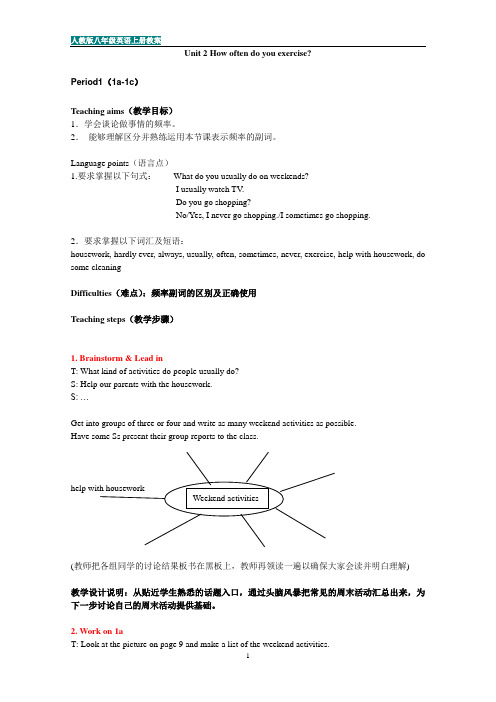
Unit 2 How often do you exercise?Period1(1a-1c)Teaching aims(教学目标)1.学会谈论做事情的频率。
2.能够理解区分并熟练运用本节课表示频率的副词。
Language points(语言点)1.要求掌握以下句式:What do you usually do on weekends?I usually watch TV.Do you go shopping?No/Yes, I never go shopping./I sometimes go shopping.2.要求掌握以下词汇及短语:housework, hardly ever, always, usually, often, sometimes, never, exercise, help with housework, do some cleaningDifficulties(难点):频率副词的区别及正确使用Teaching steps(教学步骤)1. Brainstorm & Lead inT: What kind of activities do people usually do?S: Help our parents with the housework.S: …Get into groups of three or four and write as many weekend activities as possible.Have some Ss present their group reports to the class.(教师把各组同学的讨论结果板书在黑板上,教师再领读一遍以确保大家会读并明白理解)教学设计说明:从贴近学生熟悉的话题入口,通过头脑风暴把常见的周末活动汇总出来,为下一步讨论自己的周末活动提供基础。
2. Work on 1aT: Look at the picture on page 9 and make a list of the weekend activities.Go through the answers together as a class.1.help with housework2. watch TV3. go shopping4. do some reading/read5. exercise教学设计说明:有了课前的讨论导入,这些有关周末的短语已经基本复习了,所以这一步对于学生来说很简单,所以直接和学生一起对答案就可以了。
Unit-2-How-often-do-you-exercise教案1
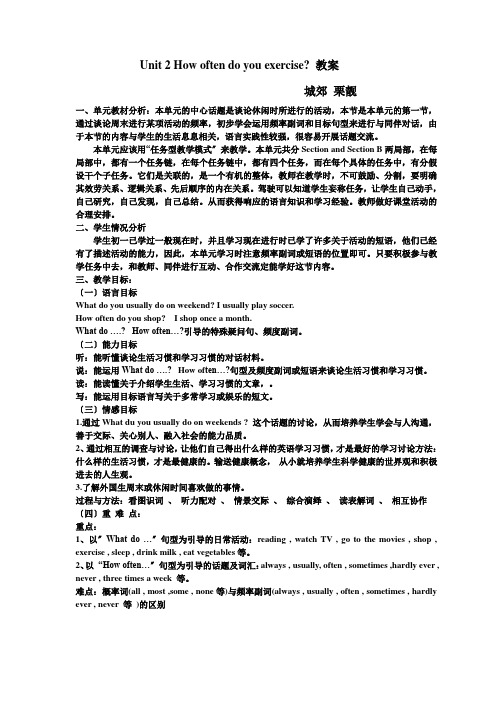
Unit 2 How often do you exercise? 教案城郊栗靓一、单元教材分析:本单元的中心话题是谈论休闲时所进行的活动,本节是本单元的第一节,通过谈论周末进行某项活动的频率,初步学会运用频率副词和目标句型来进行与同伴对话,由于本节的内容与学生的生活息息相关,语言实践性较强,很容易开展话题交流。
本单元应该用“任务型教学模式〞来教学。
本单元共分Section and Section B两局部,在每局部中,都有一个任务链,在每个任务链中,都有四个任务,而在每个具体的任务中,有分假设干个子任务。
它们是关联的,是一个有机的整体,教师在教学时,不可鼓励、分割,要明确其效劳关系、逻辑关系、先后顺序的内在关系。
驾驶可以知道学生妄称任务,让学生自己动手,自己研究,自己发现,自己总结。
从而获得响应的语言知识和学习经验。
教师做好课堂活动的合理安排。
二、学生情况分析学生初一已学过一般现在时,并且学习现在进行时已学了许多关于活动的短语,他们已经有了描述活动的能力,因此,本单元学习时注意频率副词或短语的位置即可。
只要积极参与教学任务中去,和教师、同伴进行互动、合作交流定能学好这节内容。
三、教学目标:〔一〕语言目标What do you usually do on weekend? I usually play soccer.How often do you shop? I shop once a month.What do ….?How often…?引导的特殊疑问句、频度副词。
〔二〕能力目标听:能听懂谈论生活习惯和学习习惯的对话材料。
说:能运用What do ….?How of ten…?句型及频度副词或短语来谈论生活习惯和学习习惯。
读:能读懂关于介绍学生生活、学习习惯的文章,。
写:能运用目标语言写关于多常学习或娱乐的短文。
〔三〕情感目标1.通过What du you usually do on weekends ? 这个话题的讨论,从而培养学生学会与人沟通,善于交际、关心别人、融入社会的能力品质。
howoftendoyouexercise教案精选四篇

how often do you exercise教案how often do you exercise教案「篇一」Ⅰ. 词汇1. The old man ____________(体育锻炼)every morning。
2. I often go shopping ____________ ____________(在周末)。
3. That little boy ____________ (曾经)falls off that tall tree。
4. ____________ ____________(多久一次)do you see your grandma?5. He ____________ ____________ (几乎不曾)goes to restaurant for dinner。
6. I don't often ____________ ____________ ________________________(看电影), I usually watch TⅤ。
Ⅱ. 按照次数由多到少依次写出表频率的词always (100%)___________ ___________ ____________ _______________________ (0%)Ⅲ. 单项选择1. I like English very much, so I ____________ listen to the tape in the morning。
A. usuallyB. hardly everC. never2. —____________ does he do sports every day?— He does sports for two hours every day。
A. How manyB. How oftenC. How long3. —What does your father do in the evening?—He usually ____________。
Unit2Howoftendoyouexercise单元教学设计
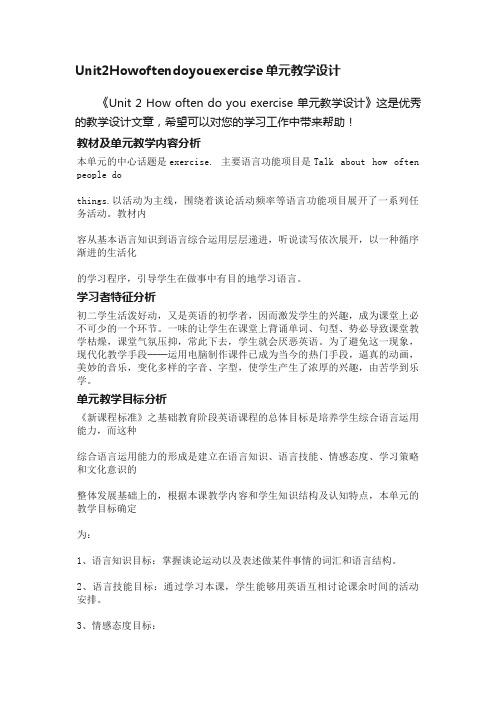
Unit2Howoftendoyouexercise单元教学设计《Unit 2 How often do you exercise 单元教学设计》这是优秀的教学设计文章,希望可以对您的学习工作中带来帮助!教材及单元教学内容分析本单元的中心话题是exercise. 主要语言功能项目是Talk about how often people dothings.以活动为主线,围绕着谈论活动频率等语言功能项目展开了一系列任务活动。
教材内容从基本语言知识到语言综合运用层层递进,听说读写依次展开,以一种循序渐进的生活化的学习程序,引导学生在做事中有目的地学习语言。
学习者特征分析初二学生活泼好动,又是英语的初学者,因而激发学生的兴趣,成为课堂上必不可少的一个环节。
一味的让学生在课堂上背诵单词、句型、势必导致课堂教学枯燥,课堂气氛压抑,常此下去,学生就会厌恶英语。
为了避免这一现象,现代化教学手段──运用电脑制作课件已成为当今的热门手段,逼真的动画,美妙的音乐,变化多样的字音、字型,使学生产生了浓厚的兴趣,由苦学到乐学。
单元教学目标分析《新课程标准》之基础教育阶段英语课程的总体目标是培养学生综合语言运用能力,而这种综合语言运用能力的形成是建立在语言知识、语言技能、情感态度、学习策略和文化意识的整体发展基础上的,根据本课教学内容和学生知识结构及认知特点,本单元的教学目标确定为:1、语言知识目标:掌握谈论运动以及表述做某件事情的词汇和语言结构。
2、语言技能目标:通过学习本课,学生能够用英语互相讨论课余时间的活动安排。
3、情感态度目标:(1)通过情景的设置和活动的开展,引导学生在体验、实践、参与、合作和交流中,积极主动地学习语言,体会在做事中学习英语的喜悦。
(2),培养学生学习英语的强烈兴趣,乐于参加各种活动的积极情感,提倡健康生活方式。
教学重点及难点教学重点:使学生熟练掌握运用Hoe often...? 问句询问他人的活动并能对他人的询问做出准确回答,使学生学会运用 I often....句型谈论自己的活动,而且能进行实际交际。
- 1、下载文档前请自行甄别文档内容的完整性,平台不提供额外的编辑、内容补充、找答案等附加服务。
- 2、"仅部分预览"的文档,不可在线预览部分如存在完整性等问题,可反馈申请退款(可完整预览的文档不适用该条件!)。
- 3、如文档侵犯您的权益,请联系客服反馈,我们会尽快为您处理(人工客服工作时间:9:00-18:30)。
Unit 2 How often do you exercise?Period 1 (1a-2c)学习内容:1a 复习动词短语并学习help with housework,1b-1c 复习频率副词,学习hardly ever, 2a-2b学习“How often do you…?”及其答语。
Learning aims:Words and phrases:housework; hardly ever; once; twice; Internet; program.Target language:what do you usually do on weekends? I usually go to the movies.What does she /he do usually on weekends ? She often goes to the movies .How often do you does he /she go to the movies? Twice a week.Ability aims:1. Can read the new words and phrases; can use the target language to talk about the things.writing skill, listening skill and communicative competence.2. To improve students’Learning important and difficult points:Words and phrases:Target language:Moral ObjectLearn to express their daily activities, and love the life.Teaching procedures:Step 1 . Lead in:1. Listen to a song.2. Talk about your last weekend’s activities.Step 2 Presentation.1. T:“What do you usually do on weekends ? ”ends.S: I usually …… on week2. Show the frequency words and read.always (100%) usually(80%) often (30-50%)sometimes (20%) hardly ever(5%) never (0%)3. Pair work: -- What do you do on weekends?--I …(Use the frequency words.)--What does she/he do on weekends?-- She/He ___________ _________________.Show some verb phrases: watch TV,read books,exercise,swim, play football、go shopping4. Learn the new language.A: How often does he do sports?He B: He always…in the morning.He often… , but sometimes he… And he hardly ever …never ...Step 3 . Work on 1a.1. Look at the picture. Discuss with your partners. Make a list of the weekend activities.2. Let some Ss read out their activities. Let other Ss add more activities.Step 4 . Work on 1b.1. Let a student read the words aloud. Make sure all the Ss know the meaning of the words.2. Tell Ss to listen and write the letters from the picture above on the line below.3. Play the tape for the first time. Ss listen and fill in the blanks.4. Play the tape for the second time for the Ss to check the answers. Step5. Pair work.1. Act out the conversation with a student.2. Let Ss talk about the pictures in 1a in pairs.3. Let some Ss act out their conversations. Step 6 Learn the new language.Show the pictures and ask and answer: How often do you exercise?--Twice a week. Step 7. Work on 2a:1. Let Ss read the phrases in the chart.2. Tell Ss that Cheng Tao is taking about how often he does these activities. Play the recording for the first time. Ss listen and number the activities [1-5].3. Play the recording for the second time for the Ss to check the answers. Step 8.Work on 2b:1. Tell Ss they will hear the recording again. This time, listen and match the activities in 2a with how often Cheng Tao does them.2. Ss listen and math the activities with the phrases.3. Check the answers. Step 9. Pair work.1. Ask one student how often he/she watch TV as a model. T: Hi, S1. How often do you watch TV? S1: I watch TV every day. T: What ’s your f avorite program? S1: Animal world. T: How often do you watch it?S1: Twice a week.2. Let one student read the activities in the chart. Tell them these new words: favorite website (最喜欢的网站);favorite sport (最喜欢的运动)3. Ss work with their partners. Then ask some pairs to act out their conversations. Step 10. Writing.According to the conversation, write about how often your partner do the activities.Example: ××is a Middle School student. He reads English twice a week. He watches TV every day. He goes to the movies once a month, and he exercises three times a week. But he hardly ever uses the Internet. Step 11 Summarize.Unit 2 How often do you exercise?What do you usually do on weekends? I usually go to the movies.What does she /he do usually on weekends ? She often goes to the movies .How often do you does he /she go to the movies? Twice a week.always 100% usually 80% often 30-50% sometimes 20%hardly ever 5% never0%Period 2 (2d-3c)Learning aims:Words and phrases:full, swing, swing dance, maybe, least, at leastTarget language:—He usually…—How often do you /does he(she)….?The use of the frequency words: always; usually ; often ; sometimes; hardly ever; neverAbility aims:1. Can read the new words and phrases; can use the target language to talk about the things.writing skill, listening skill and communicative competence.2. To improve students’Learning important and difficult points:Words and phrases and target language:Moral ObjectLearn to express their daily activities, and love the life.Teaching procedures:Step 1 Review:1.Show a subject schedule, ask and answer:How often do you have _________ class? --We have _________class ____________.Step 2 Work on 2d.1. Lead in: Show some pictures and practice:A: What does she usually do? --B: She usually has piano lessons.A: How often does she have piano lessons? --B: She has piano lessons twice a week.2. show a video, and ask : What dance? –swing dance.Claire are having dance and piano lessons. Let’s listen to her and Jack’s conversation, listen and answer:3. Read the conversation and match the activity with the right time.4. Follow the tape and then Role-play the conversation.Step 3 Grammar focus:1. Practice: show the pictures and the pie charts, ask and answer:T: How often does he play soccer ? The other Ss: He plays soccer twice a week2. read grammar focus and give some explanations.Step 4 Work on 3a.Complete the questions with do or does. Then match the questions and answers.Step 5 Work on 3b.1. Tell Ss to make questions.2. Then try to ask and answer questions about the questions.3. Ask some Ss to ask and answer with their partners in front of the class.Step 6 Work on 3c.1. Let Ss work in groups of six or e ight.2. Tell Ss discuss what activities they do to improve their English. Then write the activities inthe chart.3. Ask their group mates the questions and fill in the chart.4. Try to make a report about their partners.Period 3 Section B (1a-1e)Learning aims:Words and phrases:junk food, coffee, health, drink coffee, be good for”Learn to use “junk,Target language:what do you usually do on weekends?I usually go to the movies.What does she /he do usually on weekends ?She often goes to the movies .How often do you does he /she go to the movies?Twice a week.Ability aims:1. Can read the new words and phrases;2. can use the target language to talk about how often you do things.3. ask people about their healthy habits and express themselveswriting skill, listening skill and communicative competence.4. To improve students’Learning important and difficult points:Words and phrases and target language.Moral ObjectLearn how to arrange the life, to develop good habits.Teaching procedures:Step 1 .Warming up and leading in:Do You Like….1. T: Hello, everyone! Do you like music? Now let’s listen toIf you can sing the song, you can sing it together. Listen carefully, then who can say thenames of the food or drink ?Play the video.2. Some foods are healthy foods, some are not. Write “healthy food ; unhealthy food(junkfood)” Say the healthy food and junk food.3. Students draw the pictures of the food that they like. Then students say“I like… becauseit/they”“I I like… although it/they…”Step 2 Pair work.1. Let’s ask about how often you eat food.example: A: How often do you drink milk?B: I drink milk every day.A: Do you like it?B: No. But my mother wants me to drink it. She says it’s good for my health.2. Students work.Step 3 Work on 1a.T:Now open your books and turn to page 12. Look at 1a, match the words with thepictures.( Students match them.)Step 4 .Work on 1c.1. T: Eating healthy food can help us to keep healthy. It’s a good habit. What are the goodhabits for your health. Exercise; sleep2. Listen for the general idea of 1c.T: Next we’ll listen to a conversation between Tina and Bill.First let’s listen for the general idea.Students listen and give their answers.3. Listen for the specific ideas of 1c .T: Listen carefully again and Circle the answer to each question.4. Check the Ss’ answers.Step 5. Work on 1d.1. T: Now look at the questions in 1d . Fill in the blanks in the survey.2. Play the first time, you can just listen.Play the tape for the second time ,you can listen and find the answers.3. Check the answers.4. Listen and repeat. T: I’ll play the recording again. You’ll repeat it after the tape.Step 6. Pair work.Role play. Student A is the reporter. Student B is Tina or Bill. Try to act the conversationout .They can use their own words.Example: A: How often do you exercise?B: I exercise every day.?A: And how often do you …Step 7. Take the health quiz.(p16)Step 8. Summarize.T: And you know: Healthy lifestyle can help us get good grades. Good food and exercise helpus to study better. Look at saying.Period 4 section B (2a-2e)Step 1 . Warming- up and revision1. Daily greeting.2. Let some Ss report what he/she does on weekends.Step 2 Work on 2a.1. Let Ss discuss the activities with their classmates and rank these activities according to howoften you think your classmates do them.2. Let some Ss tell their answers.S tep 3 . Work on 2b.1. T: Here are the results of what the students in No. 5 High School do in their free time. Readthe passage quickly and find the answers to the two questions:1) How many kinds of free time activities are mentioned in the passage?2) What is the best way to relax? _________________________________2. Read the passage carefully and complete the pie chart below.Ss read the passage and try to fill in the pie chart. Then check the answers together.Step 4 Work on 2c.1. T: Now let’s read through the five questions. Make sure the Ss know the meaning of thequestions. Then le t Ss read the passage again and try to find the answers to the questions.2. Ss read carefully and try to find the answers to the questions.3. Check the answers with th e class.Step 5 Work on 2d.1. T: Now let’smake some sentences with the percentages using always, usually or sometimes.2. Ss read the passage again and try to make some new sentences. Check the answers witheach others.Step 6 Work on 2e.1. Let Ss read through the activities in the chart first. Select one activity from them. Then asktheir classmates how often they do this activity and make a pie chart.2. Ss work in groups. Ask and answer questions then fill in the chart.3. Make a pie chart like those in 2b.4. The n try to make a short report like the report in 2b.Step 7. HomeworkPeriod 5 Section B (3a-self check)Step 1 . Warming- up and revision.1. Have a dictation of the new words and expressions.2. Let some Ss read the passage in 2b.3. Check the homework.Step 2 . Presentation.1. Show some pictures of your daily activities. Tell Ss your good activities and badactivities.2. Let some Ss tell about how often they do some activities and judge they are good habits andbad habits.Step 3. Practice –work on 3a.1. Look at the information in the chart and complete the report.2. Ss read the passage then fill in the blanks with the words in the box.3. . Check the answers.Step 4. Writing--work on 3b.1. Complete the chart with your own information. Then in the last column, use expressionslike always, every day, twice a week and never.2. Then let some Ss show their chart to the class.Step 5 Work on 3c.1. Let Ss write a report about their good habits and bad habits. Say how often they do thingsusing the report in 3a as an example.2. Students write.3. Check the compositions and let some Ss read their compositions.Step 6 Self Check 1 and 2.1. Students discuss.2. Let some Ss read aloud their chart. Then try to write five sentences using the informationabove.3. Make sure they use the correct forms of the verbs.Step 7 Self check 3.1. Tell Ss that they should read the conversation and then fill in the blanks with the rightforms.2. Ss read the conversations and try to fill in the blanks.3. Check the answers:usually, How often, Hardly, How often, once a; never4. Let Ss practice the conversation with their partner.Step 8. Homework.1. Review Section B.2. Write a short passage your father or m other’s good habits or bad habits.。
